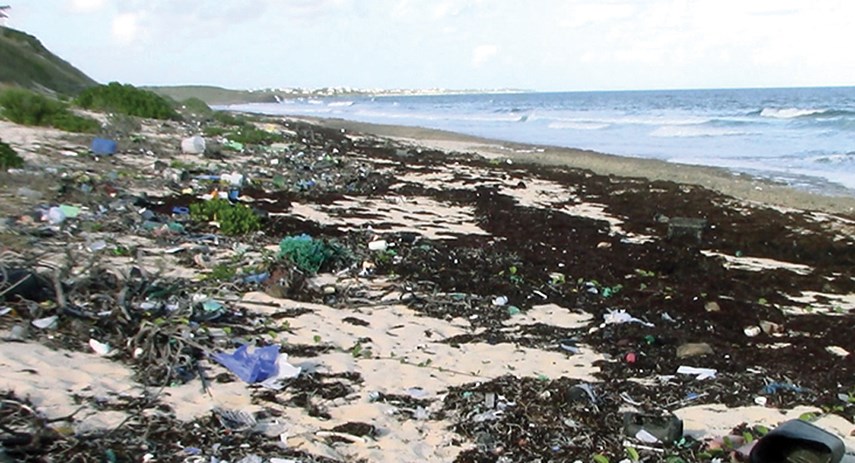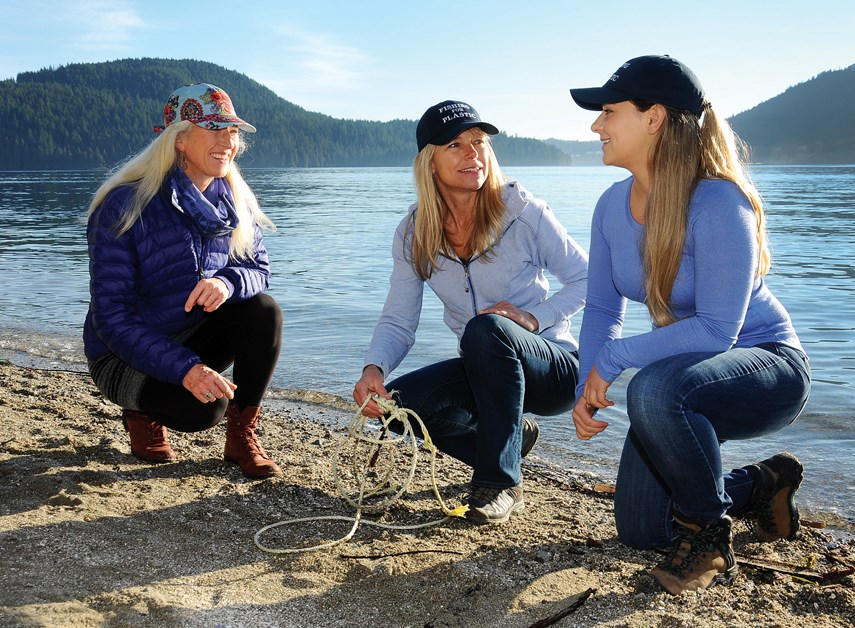The boat was easing into a Malaysia port town when a trash raft glommed onto the vessel’s hull like a remora sharksucker hitching a ride on a manta ray.
The collection of flip-flops, water bottles and plastic refuse obscured the water around the boat. It looked thick enough to walk on, Angela Burns recalls.
“This isn’t land,” she warned her children.
Burns, an operating room doctor at Lions Gate Hospital, has spent years at sea. The Hillside Secondary grad traversed the Pacific Ocean’s gyre of plastic, which is “not actually matted together like the state of Texas,” she says. She’s dropped anchor on Chagos Archipelago, a tiny landmass in the Indian Ocean 500 kilometres south of the nearest population. Roughly equidistant from Tanzania and Indonesia, there’s barely a soul in sight. But you can plastic bobbing in the ocean and fouling the shoreline, she notes.
“It seemed like no matter where we were, how remote, there was just plastic garbage on all these gorgeous beaches, even when there were no people,” she says.
The daughter of a dentist, Burns says she wanted to be a doctor since she was a child taking splinters out of friends and family members. But for the last 11 years she’d been thinking about taking plastic out of the ocean.
She’d conferred with fellow environmentalist and professional captain Bill Atherholt on possible solutions but with kids in school, a demanding career and “life in general,” there never seemed time to implement any of those plans, Burns reflects. But it was outside Port Klang, Malaysia, that things “came to an absolute head,” she recalls.
The sight of plastic refuse eclipsing Port Klang’s natural splendour convinced Burns it was time to launch Fishing for Plastic.
Beginning this May, Burns and Atherholt are planning to pay Bahamian fishermen to harvest plastic from shore and the sea around Marsh Harbour in Abaco Islands.
“To me, it seems like a perfect marriage between cleaning up the beaches, helping provide an income for them and also hopefully easing some of the pressure on the fish stocks,” Burns explains. “We feel it’s just the time.”
While specifics need to be worked out, Burns imagines fishermen might spend a few hours plucking plastic each day and possibly more during the shoulder seasons, before returning their catch to a depot where they’d be paid; likely based on the weight of the plastic.
The plastic would then go to the landfill, although Burns says she wants to explore alternatives to simply piling on the junk heap.
“Although that’s better than (plastic) sitting on the beaches and being in the ocean – it’s better for fish and wildlife – it’s not ideal,” Burns says, suggesting recycling or plastic-to-fuel conversion as possible future options.
Burns and Atherholt are slated to meet with fishermen and a local group of environmentalists in March to work out the program’s details following a Feb. 2 fundraiser at The View on Lonsdale.

Burns says she’s hoping to raise $25,000 with the event, which includes a silent auction and live music.
In order for the pilot project to succeed, however, Burns estimates they’ll need about $50,000 by May.
Fishing for Plastic may get a boost from the tourism industry, environmental groups or the Bahamian government in the future.
But right now everything is contingent on the success of the pilot project, Burns says.
While Burns and Atherholt chose to base Fishing for Plastic out of Marsh Harbour for logistical reasons, (Atherholt will likely be stationed in a boat off the coast of Florida and Burns can fly back and forth without breaking the bank.) the Bahamas are also an example of the global nature of plastic pollution.
Examining the Abaco Islands beaches, Burns says some of the trash – including plastic octopus traps – likely drifted in from as far away as Northern Africa.
In promoting Fishing for Plastics, Burns says she’s been “delighted” to realize that many people understand just how inescapable plastic has become.
“I feel a little bit like in the Vancouver area that we’re preaching to the converted,” she says.
Burns’ ambition is for Fishing for Plastic to become an environmental franchise.
“Our hope is that after a year or two or after things are up and running, that it will be maintained by the community,” she says. “Then we can go to the next location and bring it to another community. It’s going to stay small and community based.”
Burns and Atherholt are planning to work with Friends of the Environment, a Bahamian non-profit that conducts period beach cleanups, according to Burns. However, their volunteers can’t keep up with the steady flow of debris, according to Burns.
They’re planning to stem the polymer tide with a plastic fishing derby in May in which prizes will be awarded for the biggest plastic catch and for the strangest item found.
For more information or to donate to the cause visit fishingforplastic.com.



